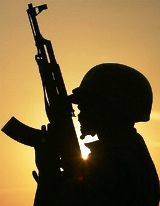Darfur hybrid peacekeeping operation still needs key gears
October 8, 2007 (UNITED NATIONS) — The hybrid United Nations-African Union peacekeeping operation that will be deployed in the war-torn Darfur region has shortfalls in several key aviation and ground transport capacities, senior UN officials today, warning that the mission’s ability to carry out its basic work will be in jeopardy.
 The mission is on track to reach its benchmarks for the deployment of initial essential personnel before January, when it is scheduled to take over from the existing AU mission, Assistant Secretary-General Jane Holl Lute told reporters in New York.
The mission is on track to reach its benchmarks for the deployment of initial essential personnel before January, when it is scheduled to take over from the existing AU mission, Assistant Secretary-General Jane Holl Lute told reporters in New York.
Holl Lute, who is the acting head of the Department of Field Support, said most key posts in the leadership of the mission (to be known as UNAMID) have been identified and filled, with only a few such appointments remaining.
Two battalions are also being readied to be deployed to strengthen the AU mission ahead of UNAMID taking over, she said, while progress has also been made on major contracts in the areas of civilian aviation, fuel and rations.
But Under-Secretary-General for Peacekeeping Affairs Jean-Marie Guéhenno said that UNAMID is still lacking ground transport, light tactical helicopters and transport helicopters. “These capacities are vital… If we don’t have the force enablers, I am concerned” that the mission will be unable to deliver on the key aspects of its work, Guéhenno said.
Jane Holl Lute said the deployment wouldn’t be delayed or halted after a certain point because of the lack of transport units. But she said it could “significantly impair” the ability of the force to operate once it reaches Darfur.
“If you want to ensure the protection of civilians, you need that mobility, you need the capacity to transport troops quickly to a place you hear there is some trouble developing and you need to have the firepower and the strength to immediately dominate the situation,” Guehenno said.
A vast majority of the troops committed to the force thus far are from African countries. There has been concern, however, about whether African countries alone would be able to meet the U.N. technical standards for the mission, including providing specialized aviation and ground transport units.
Lute said U.N. officials were still negotiating with a few select troop-contributing countries that have such units and indicated they may reconsider taking part in the mission. She didn’t identify which countries they were, nor if they would be acceptable to the Sudanese government.
The joint U.N.-AU force is meant to replace a beleaguered 7,000-member A.U. force that has been unable to stop the bloodshed in Darfur, a vast western Sudanese region where more than 200,000 people have died in 4 1/2 years of fighting.
Guéhenno pointed to recent attacks on AU peacekeepers in Haskanita, where over a dozen people were killed and many more wounded before the South Darfur town was burned down, in underscoring the need for “troops that are very mobile with a capacity to dominate any situation.”
Noting that several European countries were stepping forward to provide resources for a separate peace mission (to be known as MINURCAT) in neighbouring Chad and the Central African Republic (CAR), he called for similar commitments to UNAMID.
“Otherwise it would be very dangerous if what is the most challenging situation – the situation in Darfur – did not have the right resources. That would put in jeopardy all our efforts to stabilize this region where there has been much too much suffering.”
Since fighting between rebels, Government forces and allied Janjaweed militia broke out in 2003, an estimated 200,000 people have been killed and at least another 2.2 million forced to flee their homes. Some 4 million Darfurians now depend on humanitarian aid.
Guéhenno said he was concerned that the situation on the ground in Darfur has deteriorated in recent weeks, particularly in the south, where a base with the AU mission was overrun a week ago and many troops were killed.
He stressed it was also vital for there to be progress in implementing the comprehensive peace agreement (CPA) ending the separate north-south civil war in Sudan.
The Under-Secretary-General added that a technical team has been sent to the Sudanese capital, Khartoum, to finalize the deployment plan for UNAMID, which at full capacity should have more than 19,000 troops, over 6,000 police and 5,500 civilian staff.
So far the UN and the AU have agreed that Burkina Faso, Egypt, Ethiopia, Gambia, Ghana, Kenya, Malawi, Mali, Nigeria and Senegal are providing either an infantry battalion or a logistics, reconnaissance, transport, military police or sector reserve company to UNAMID, which is to have a predominantly African composition.
Bangladesh, Jordan, Nepal, the Netherlands, Thailand and the Nordic countries in Europe are also providing similar resources, as well as a field hospital.
Ms. Holl Lute noted that the Sudanese Government has given assurance that Darfur’s airstrips will be made available for the use of UNAMID so that it can be deployed.
But the mission does not yet have agreement for the land needed to facilitate the deployment of the heavy support package, a transition phase between the current AU mission and UNAMID.
“We have an engineering unit that is due by the end of this month that will depend on land being secured,” Ms. Holl Lute said. “So we have a team on the ground in Nyala [the state capital of South Darfur] right now negotiating with the local government to ensure that we have a place for them to go.”
(ST/UN/AP)
